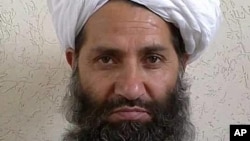The reclusive Taliban chief said Friday that he would not allow foreign interference in his Islamic governance in Afghanistan, come what may.
Hibatullah Akhundzada spoke to worshippers in a mosque in the southern city of Kandahar at the start of the three-day Eid al-Fitr festival to mark the end of the Muslim fasting month of Ramadan.
Akhundzada hailed the establishment of what he described as an Islamic "Sharia-based" government in Afghanistan after the Taliban reclaimed power in August 2021.
"It is the success and good fortune of the Afghan nation that Allah has blessed them with an Islamic Sharia system," he said. "I have promised Allah that so long as I am alive, not a single law of infidelity will find a place in Afghanistan."
Akhundzada, officially referred to as the leader of the Islamic Emirate of Afghanistan and commander of the faithful, said that he would forbid "any action that threatens or negates Islam and is against Islamic principles."
Media was, as usual, not allowed to cover the speech of the unseen Taliban leader, an Islamic scholar who rarely leaves Kandahar, the Taliban heartland. His spokesman officially released audio of the sermon late Friday.
Taliban not recognized as legitimate
The Taliban waged a deadly insurgency for almost two decades. They seized control of the country 20 months ago from the then-internationally backed Afghan government as the United States and NATO troops withdrew after two decades of involvement in the war.
Akhundzada has since issued a series of edicts, banning girls' education beyond the sixth grade and barring most Afghan women from public life and work across Afghanistan. The ban has recently been extended to nongovernmental organizations and the United Nations despite severe global criticism and demands to end restrictions on women.
The international community has refused to recognize the Taliban as the legitimate rulers, citing bans on women's access to education and work, among other human rights concerns.
Friday's defiant speech by the Taliban leader came as U.N. Secretary-General Antonio Guterres plans to host a meeting of envoys on Afghanistan from countries around the world in Qatar early next month to discuss the way forward in the wake of intensifying restrictions on Afghan women.
The United States has rejected any discussions about recognizing the Taliban at the U.N.-hosted meeting scheduled for May 1-2.
"The intent of — purpose of this meeting was never to discuss recognition of the Taliban, and any discussion at this meeting about recognition would be unacceptable to us," Vedant Patel, the principal deputy spokesperson of the U.S. State Department, told reporters on Thursday.
The rebuttal came after U.N. Deputy Secretary-General Amina Mohammed shared details of the planned meeting in the Gulf state, suggesting the recognition issue would also be on the agenda.
"We hope that we will find those baby steps to put us back on the pathway to recognition … of the Taliban — in other words, there are conditions," Mohammed told a seminar at Princeton University on Monday.
That discussion must happen because Taliban authorities demand diplomatic recognition, and "that's the leverage we have," she stressed.
Taliban demands UN 'fulfill its responsibility'
U.N. spokesman Farhan Haq, speaking to reporters in New York on Thursday, attempted to downplay Mohammed's remarks, saying the deliberations at the meeting in Qatar's capital, Doha, would not focus on recognition of the Taliban.
"The point of the discussion, which will be held in a closed, private setting, is to build a more unified consensus on the challenges at hand," Haq said.
"There's a need to reinvigorate international engagement around the sort of common objectives that the international community has on Afghanistan. We consider it a priority to advance an approach based on pragmatism and principles to have a constructive engagement on the issue," he said.
Taliban chief spokesman Zabihullah Mujahid has demanded that the U.N. "fulfill its responsibility" toward the people of Afghanistan.
"Islamic Emirate wants the recognition process to be completed soon. It will build mutual trust with world countries and help resolve all issues that can benefit regional security and stability," Mujahid told VOA. He used the official title of the Taliban government.




